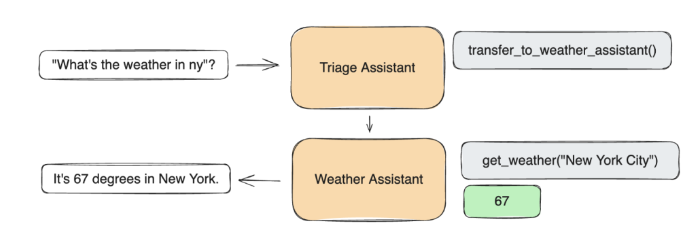In the field of artificial intelligence, the management and coordination of multi-agent systems have always been a huge challenge for developers. Complex system architecture, large resource consumption, and effective interaction between agents all bring many difficulties to development and deployment. In order to deal with this problem, OpenAI launched an experimental tool-Swarm framework, designed to simplify the management and coordination of multi-agent systems and improve development efficiency.
Today, with the rapid development of artificial intelligence, developers are faced with an important challenge, which is how to efficiently manage complex multi-agent systems. Such systems involve the collaboration of multiple AI agents. However, how to achieve effective coordination and control is often tricky. Additionally, some current solutions require significant resources, making deployment and testing more complex.
To solve this problem, OpenAI launched the Swarm framework, an experimental tool designed to simplify the management and coordination of multiple agents.

Swarm focuses on making the interaction, execution, and testing between agents more lightweight and efficient, thereby helping developers more conveniently manage the interaction of multiple AI agents. After months of development of this framework, OpenAI has finally made it public, hoping to be widely used by the AI community to help build more advanced AI systems.
The power of Swarm lies in its two basic concepts: agents and task handover. In Swarm, an agent combines specific instructions and tools that can be used to complete a task. During the execution of the task, the agent can "hand over" the task to another agent at any time. This design makes the coordination between the agents seamless and flexible. This abstraction not only enables complex agent interactions but also ensures that the entire coordination process remains under tight control. Thanks to these designs, Swarm is able to remain lightweight, making testing and iteration easier.
The Swarm framework has several important advantages. First, it provides a smooth way to manage communication between agents and can dynamically transfer task responsibilities, which is especially critical for agents with expertise in different tasks. Secondly, Swarm's lightweight design allows developers to easily iterate, test, and optimize multi-agent configurations without having to worry about complex infrastructure issues. Finally, Swarm's high degree of controllability makes it an ideal choice for researchers and developers who want to ensure the reliability and efficiency of AI agent coordination.
OpenAI's Swarm framework strives to overcome major challenges in multi-agent system management by focusing on simplicity and controllability. With its lightweight infrastructure and task handover mechanism, Swarm not only makes multi-agent coordination possible, but also provides practical solutions for various application scenarios.
As the importance of multi-agent systems continues to increase in AI research and applications, tools like Swarm will significantly lower the development threshold, improve accessibility, and ultimately promote the development of more powerful and diverse AI solutions.
Project entrance: https://github.com/openai/swarm
The editor of Downcodes concluded: OpenAI's Swarm framework provides a new idea for solving multi-agent system management problems. Its lightweight design and task handover mechanism are worthy of attention. It is expected that the Swarm framework can be widely used in the AI community and promote the development of more advanced multi-agent systems.